Crunchbase Alternatives
Find your Crunchbase alternative. We review 10 platforms, comparing their data, features, and pricing to help you make the right choice.
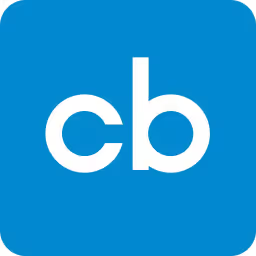
Crunchbase is a well-known B2B database. Many people use it for lead generation and sales intelligence, and it works well for finding company funding data. It is a solid tool for getting a quick overview of the private market.
However, some users report that its data can be incomplete or outdated, and the price can be a factor. For this reason, we have analyzed the top alternatives to help you find a better fit for your needs. Let's get started.
A Note on 11x Digital Workers
Before we review direct competitors, consider 11x. It offers digital workers for sales teams. These workers can manage tasks like lead research and outreach. This approach allows your human sales staff to concentrate on higher-value activities and offers a different path to sales growth.
We provide 11x, a GTM platform where AI agents manage the sales process. Alice finds prospects, runs outreach, and updates your CRM. Julian qualifies inbound leads and books meetings. Our platform unifies data enrichment, outreach, and email warmup, which removes the need for separate tools.
Crunchbase Alternatives
This section provides a detailed look at the main alternatives to Crunchbase. We analyze each option based on its pricing, features, and specific benefits and drawbacks.
1) PitchBook
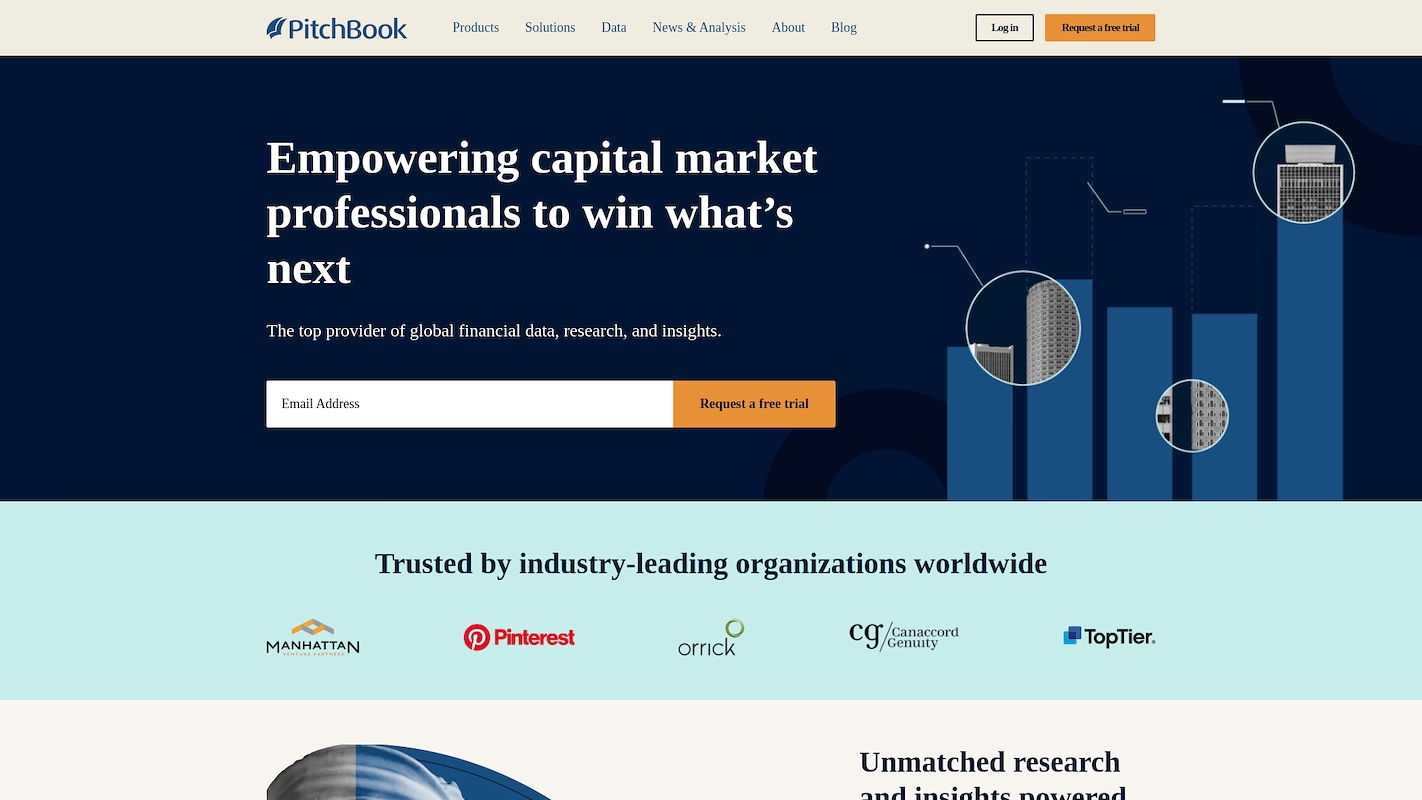
PitchBook provides financial data, research, and insights. It combines a public and private market database with proprietary analyst research. The platform turns raw data into intelligence for professionals to source deals, perform due diligence, and analyze markets.
It targets capital-market professionals and offers an integrated suite with data, news, and analytical tools in one location.
PitchBook's Main Features
- Covers public and private companies, deals, investors, funds, M&A, debt, and professionals.
- Provides proprietary research, including thousands of analyst reports and market commentaries.
- Integrates with workflows via desktop and mobile apps, a Chrome extension, API access, and plugins for Excel and PowerPoint.
- Offers workflow-specific solutions for asset allocation, deal sourcing, due diligence, and fundraising.
How PitchBook Compares to Crunchbase
Average Review score: 4.5/5 stars based on 196 G2 reviews.
- PitchBook provides proprietary analyst reports and market commentary. This offers deeper insights compared to the data-focused approach of Crunchbase.
- It offers detailed financial data on private companies, M&A, and funds. This level of detail is often more extensive compared to Crunchbase.
- The platform integrates directly with Excel and PowerPoint through plugins. This allows for easier data export and report creation, a feature not as central to Crunchbase.
- Its platform includes advanced charting and data visualization tools to analyze market trends directly, a more developed feature compared to Crunchbase.
- Users often report responsive customer support. This dedicated support model is different from the self-service approach common with Crunchbase.
Where PitchBook Falls Short of Crunchbase
- PitchBook’s subscription cost is considerably higher, which can be a barrier for smaller firms. Crunchbase, by contrast, provides a free tier and more affordable plans.
- Its focus on established capital markets means it sometimes has less data on very early-stage startups compared to Crunchbase, which often has broader coverage of new companies.
- The tool relies on an internal research team for data verification. This can sometimes cause update delays in fast-moving sectors, while Crunchbase’s community-edit model may offer quicker updates.
Pricing and Subscription Costs
Crunchbase offers transparent pricing, with its Pro plan available for $588 per year. In contrast, PitchBook does not publish its prices and requires a sales inquiry, a model that typically corresponds with a significantly higher cost aimed at enterprise customers.
2) CB Insights
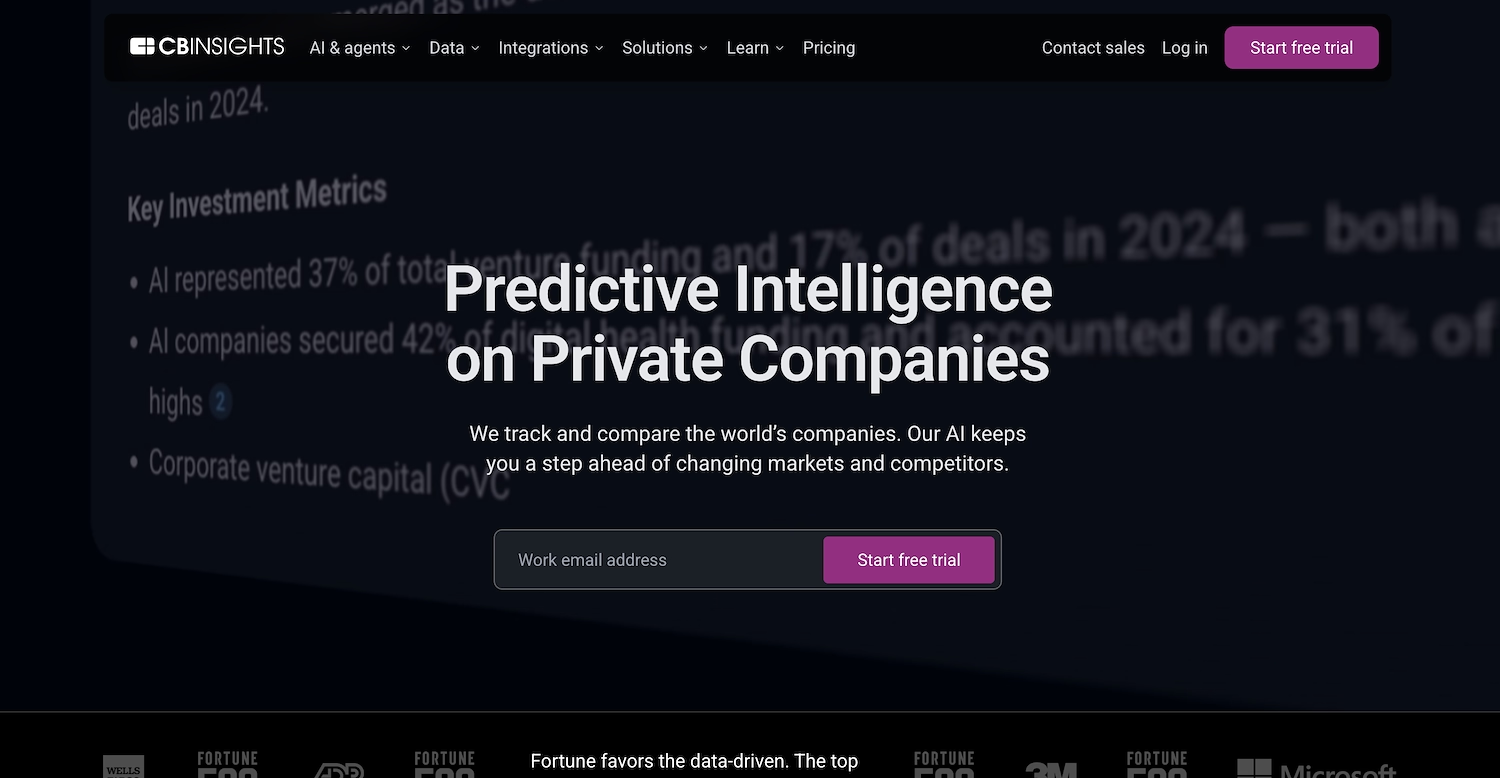
CB Insights is a market-intelligence platform that uses AI for strategic decisions. Its proprietary Business Graph covers over 10 million companies. The platform analyzes data on private and public companies to surface insights on competitors, markets, funding, and M&A.
It helps organizations formulate strategy, find M&A targets, and monitor competitors. The tool is built for large enterprises, M&A professionals, and sales teams who need vendor intelligence.
CB Insights's Main Features
- Features a generative-AI assistant, ChatCBI, that answers strategic questions using proprietary data and automates tasks like M&A analysis.
- Provides proprietary predictive metrics, such as the Mosaic Score and Exit Probability, to assess company health and benchmark performance.
- Delivers a personal AI-generated daily email briefing that summarizes market signals and recommends specific actions.
- Includes a Strategy Terminal web app for advanced search, automatic market analysis, and customer-transcript mining.
How CB Insights Compares to Crunchbase
Average Review score: 4.3/5 stars based on 14 G2 reviews.
- CB Insights features a generative-AI assistant, ChatCBI, to answer strategic questions. This offers a conversational way to analyze data, which differs from the standard search functions on Crunchbase.
- The tool uses proprietary predictive metrics like the Mosaic Score to evaluate a company's health. This provides a layer of predictive analysis not available on Crunchbase, which presents more direct company data.
- It provides high-quality research reports and market maps that analyze emerging tech trends. This focus on analyst-driven content contrasts with Crunchbase's model, which relies more on user-contributed data.
- Users get a personal AI-generated daily email briefing with tailored market signals. This proactive delivery of insights is a different approach compared to the on-demand data retrieval model of Crunchbase.
- The platform includes patent data analysis to help spot innovation trends. This offers a view into a company's R&D, a dimension less detailed in Crunchbase's company profiles.
Where CB Insights Falls Short of Crunchbase
- Some users find the user interface complex, which can make navigation difficult. This contrasts with Crunchbase, which offers a more straightforward layout for quick data searches.
- CB Insights does not publish its pricing, requiring a sales inquiry. This is different from Crunchbase, which provides transparent pricing plans and a free version for basic access.
- The platform sometimes has gaps in its contact data. Crunchbase, in comparison, often provides more comprehensive contact information, which is a benefit for sales and outreach.
Pricing and Subscription Costs
Crunchbase offers transparent pricing with its Pro plan at $588 per year, making it accessible for individuals and small businesses. In contrast, CB Insights uses a custom pricing model that requires a sales inquiry, which is common for enterprise-focused tools. For a quote, visit CB Insights 's official website.
3) Owler
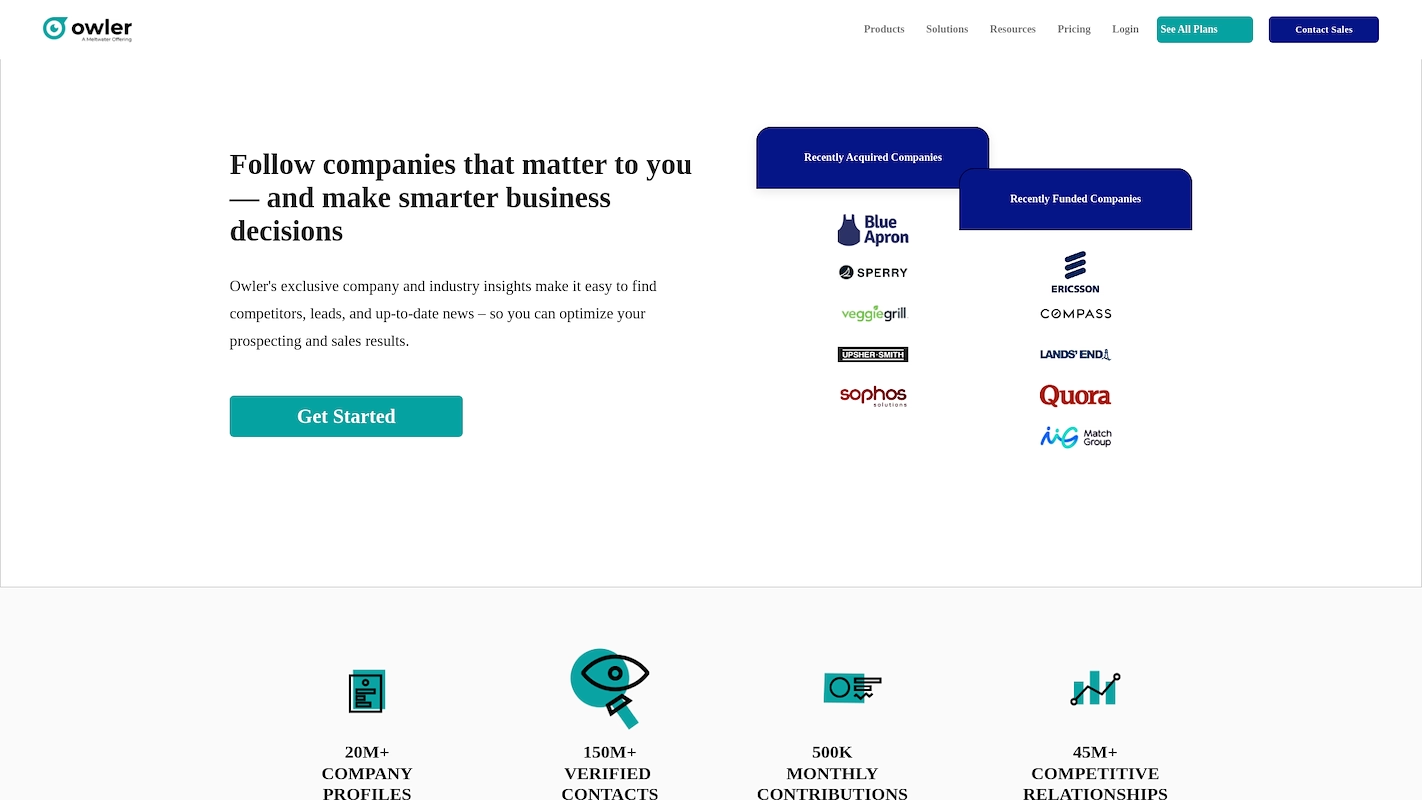
Owler is a competitive-intelligence platform that tracks over 20 million companies. Users follow businesses to get real-time alerts on events like funding or M&A. The data helps generate leads, discover competitors, and prepare personalized outreach.
It maps over 45 million competitive relationships. This helps professionals monitor market moves, find new accounts, and adjust strategy based on competitor actions.
Owler's Main Features
- Provides a "Competitor Graph" that maps over 45 million relationships to show direct and indirect competitors.
- Delivers daily personalized email alerts and real-time news updates for any companies a user follows.
- Leverages over 500,000 monthly community contributions to help keep its 20 million company profiles current.
- Offers advanced search filters for revenue, sector, location, employee count, and public or private status.
How Owler Compares to Crunchbase
Average Review score: 4.3/5 stars based on 480 G2 reviews.
- Owler provides a "Competitor Graph" that maps out competitive relationships. This offers a more visual way to see direct and indirect competitors compared to the standard lists on Crunchbase.
- It delivers daily personalized email alerts for companies you follow. This proactive approach differs from Crunchbase, where users typically search for information on demand.
- The platform uses a large volume of monthly community contributions to keep its data current. This model is similar to Crunchbase but focuses more on real-time news and company events.
- Owler's main strength is its focus on aggregating real-time news and press releases. Crunchbase, in contrast, puts more emphasis on company funding rounds and organizational structure.
Where Owler Falls Short of Crunchbase
- Owler focuses on news alerts about funding events. Crunchbase, in comparison, provides more detailed historical funding data and cap tables, which offers a deeper financial overview.
- The tool's user interface can sometimes feel clunky to navigate. In contrast, Crunchbase generally provides a more straightforward layout that allows for quick and direct data searches.
- It sometimes has gaps in its contact data for professionals. Crunchbase, by comparison, often includes more extensive contact details, a benefit for direct sales and outreach activities.
Pricing and Subscription Costs
Owler's Pro plan costs $468 annually, offering a more budget-friendly option than Crunchbase's $588 Pro plan. Both platforms have free tiers and custom enterprise pricing; for the latest details, visit Owler's official website.
4) PrivCo
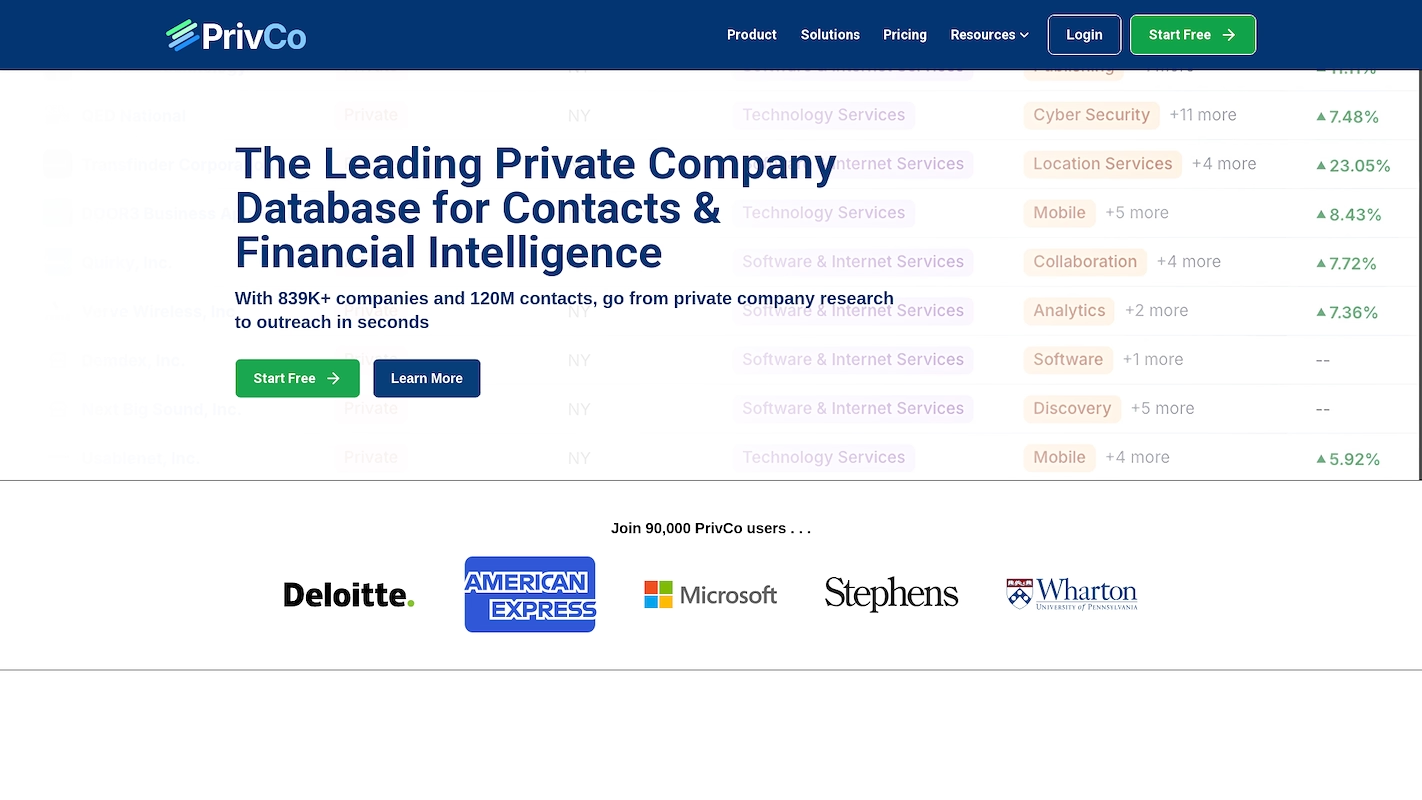
PrivCo provides financial data on private companies. The platform supports lead generation and sales intelligence. It offers a B2B database with details on company financials, ownership, and M&A activity. Professionals use the tool for market research and to find sales triggers.
PrivCo's Main Features
- Covers over 893,000 private U.S. companies, with an emphasis on bootstrappers and other firms that are difficult to find.
- Provides current and historical financial data, including revenue, EBITDA, valuations, growth metrics, and ownership details.
- Uses proprietary algorithms and machine-learning models for large-scale data analysis and keyword tagging.
- Offers advanced search filters based on ownership, funding, geography, industry, revenue, and valuation.
How PrivCo Compares to Crunchbase
Average Review score: 4.0/5 stars based on 1 G2 review.
- PrivCo focuses on hard-to-find U.S. private companies, including bootstrapped firms. This is different from Crunchbase, which has a broader scope that includes global early-stage startups.
- It provides detailed financial data such as revenue, EBITDA, and valuations on private firms. This level of financial information is often more in-depth compared to the data on Crunchbase.
- The tool uses proprietary algorithms for its data analysis. This approach contrasts with Crunchbase's model, which also incorporates community edits and public announcements.
- Its search filters are built for financial analysis, with options for ownership type and specific valuation metrics. Crunchbase's search is more oriented toward finding companies based on funding stages.
Where PrivCo Falls Short Of Crunchbase
- PrivCo focuses only on U.S. companies. This is different from Crunchbase, which provides data on businesses around the world.
- The platform relies on its own research for data. In contrast, Crunchbase uses a community-edit model, which can sometimes result in faster updates for new company information.
- It may have less information on very early-stage startups. Crunchbase, by comparison, often has broader coverage of new companies and recent funding announcements.
- Some users may find fewer public reviews for the tool. This makes it harder to gauge user satisfaction compared to Crunchbase, which has a large volume of public feedback.
Pricing and Subscription Costs
PrivCo's pricing starts at $149 per month for its Select plan and is $1,299 annually for the Plus plan. In comparison, Crunchbase Pro is a more budget-friendly option at $588 per year. For detailed pricing, visit PrivCo's official website.
5) Tracxn
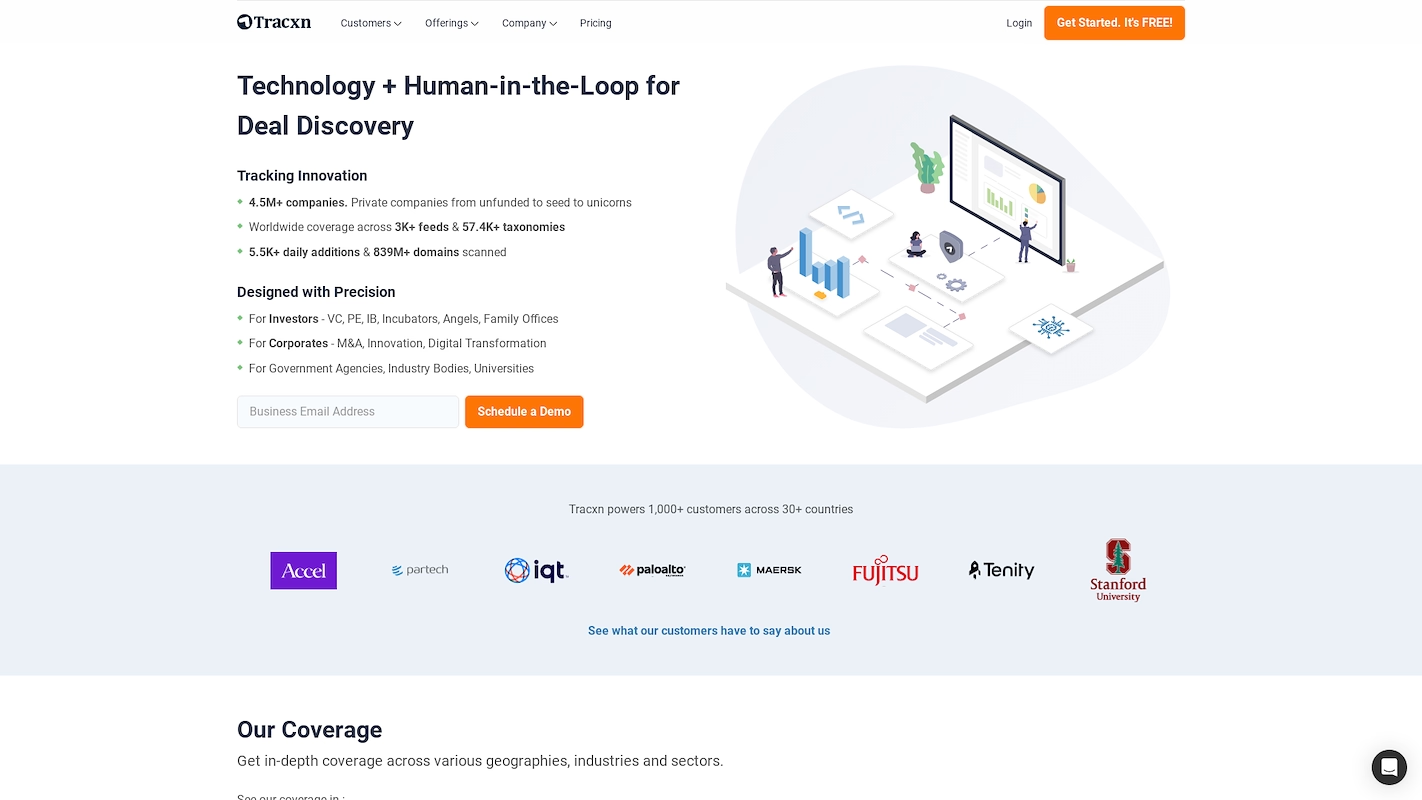
Tracxn provides a B2B database to track private companies globally. Professionals use it for lead generation, deal discovery, and competitive analysis. The platform offers data on startups and private firms to help users monitor market trends and identify sales triggers, which supports strategic business decisions.
Tracxn's Main Features
- Provides in-depth market intelligence, including Soonicorn and Unicorn tracking, market maps, and over 1,000 sector reports per quarter.
- Offers mandate-based deal alerts and scans based on sectors, themes, alumni, and investor portfolios.
- Includes a built-in deal-flow CRM and portfolio tracker to manage workflows.
- Supplies due-diligence data, including valuations, cap tables, revenue metrics, and competitor grids.
How Tracxn Compares to Crunchbase
Average Review score: 4.2/5 stars based on 14 G2 reviews.
- Tracxn provides over 1,000 analyst-written sector reports each quarter. This offers deeper market analysis compared to the data-centric profiles on Crunchbase.
- The platform includes a built-in deal-flow CRM to manage workflows. This is different from Crunchbase, where users often export data to other tools.
- It offers specialized tracking for "Soonicorns" and mandate-based deal alerts. This allows for more targeted discovery than the general search functions on Crunchbase.
- The tool uses a detailed industry taxonomy to classify companies. This provides more granular market segmentation than the broader categories found on Crunchbase.
Where Tracxn Falls Short of Crunchbase
- Some users report that Tracxn's database occasionally misses certain startups or has update delays. In contrast, Crunchbase uses a community-edit model, which can sometimes result in quicker updates for newly formed companies.
- The platform can have a learning curve for new users. Crunchbase, by comparison, offers a more direct user interface that many find easier to navigate for quick data lookups.
- Its pricing model is not public, and some find that many key features require a paid subscription. This approach differs from Crunchbase, which provides a free access tier and transparent annual pricing.
Pricing and Subscription Costs
Crunchbase offers transparent pricing, with its Pro plan available for $588 per year. In contrast, Tracxn does not publish its prices and requires a sales inquiry for a custom quote. For the most current information, visit Tracxn's official website.
Consider 11x for Sales Automation
If digital workers for sales fit your goals, consider 11x. Our AI agents handle lead research, outreach, and CRM updates. This frees your sales team to focus on deal closure and strategic growth. Learn about 11x.
With 11x, we manage your sales process. Alice finds accounts, enriches data, and handles outreach. Julian qualifies inbound leads and schedules meetings. Our platform unifies data enrichment, outreach, and email warmup, which replaces multiple tools in a traditional GTM stack.
To see how it works, book a demo.
6) Dealroom

Dealroom is a global data platform for intelligence on startups and tech ecosystems. It provides a B2B database that helps professionals find leads, identify sales triggers, and conduct market research on high-growth companies and investment strategies.
Dealroom's Main Features
- Provides intelligence on global startups and technology ecosystems.
- Identifies sales triggers to support lead generation and market research.
- Supports analysis of high-growth companies and investment strategies.
How Dealroom Compares to Crunchbase
Average Review score: 4.3/5 stars based on 66 G2 reviews.
- Dealroom is a dedicated M&A platform with virtual data room features. This differs from Crunchbase, which is a broader database for general company discovery.
- It provides workflow automation tools built for managing M&A deals. This offers more process control compared to the general data-gathering functions of Crunchbase.
- The platform includes granular permissions for secure collaboration on sensitive documents. This is a more specialized security feature than the standard user access on Crunchbase.
- Dealroom centralizes all M&A documents and diligence requests in one place. In contrast, Crunchbase users often need other tools to manage deal-related files.
Where Dealroom Falls Short Of Crunchbase
- Dealroom has a high subscription cost, which can be a barrier for smaller firms. In contrast, Crunchbase offers a free version and a more affordable Pro plan.
- The platform focuses on M&A deal management. This means it may have less data on early-stage startups compared to Crunchbase, which provides broader company discovery.
- Some users find the interface can have occasional glitches. Crunchbase, by comparison, generally offers a more straightforward layout for quick data searches.
Pricing and Subscription Costs
Crunchbase offers transparent pricing, with its Pro plan costing $588 per year. In contrast, Dealroom does not publish its prices and requires a sales inquiry, a model that typically corresponds with a higher cost aimed at enterprise customers. For the latest pricing, visit the Dealroom website.
7) S&P Capital IQ Platform
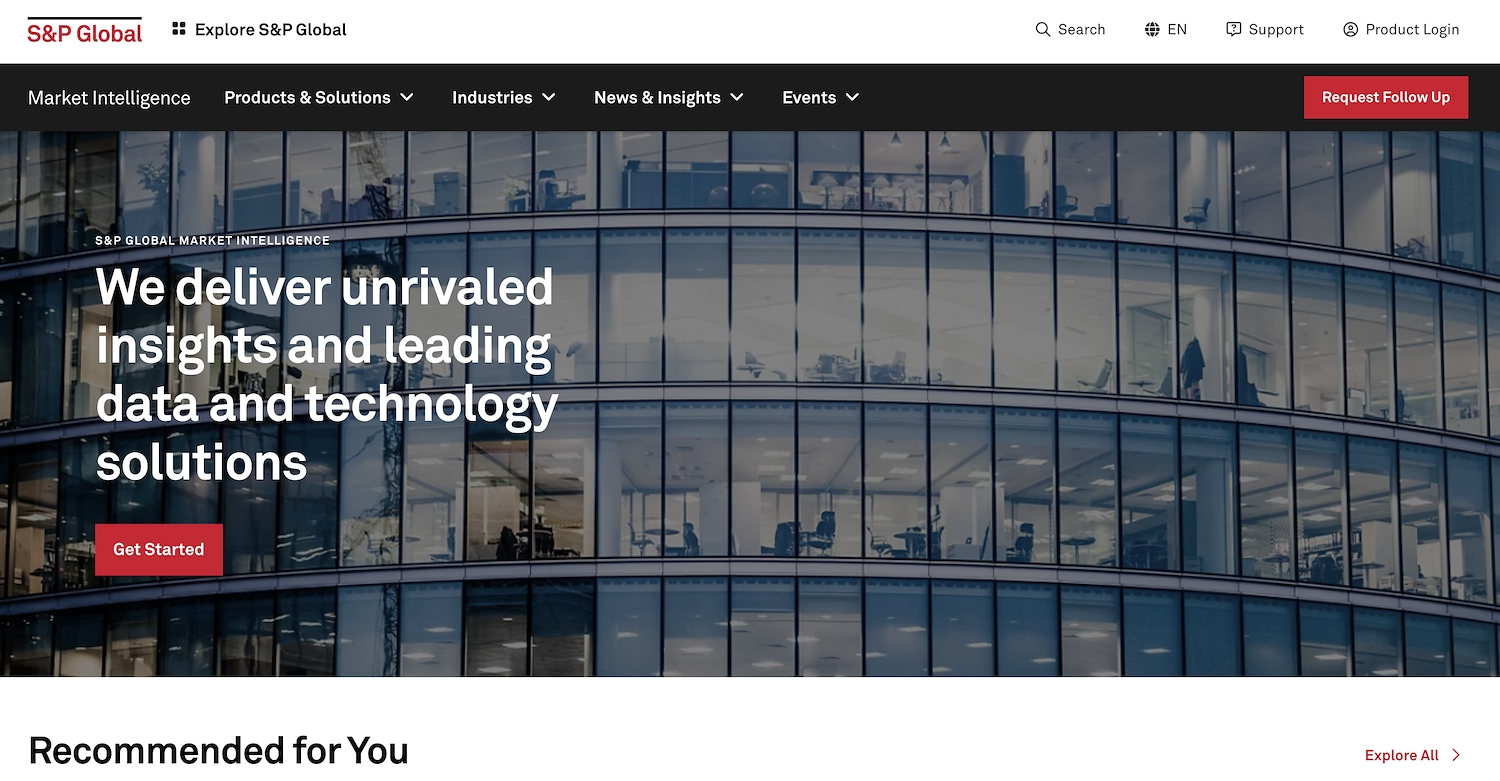
The S&P Capital IQ Platform is a research and analysis tool with data on public and private companies, markets, and people. Its B2B database contains financials, ownership details, and transaction data to support corporate finance.
Professionals use the platform for lead generation and sales intelligence. The tool helps identify sales triggers through its market data and analysis functions.
S&P Capital IQ Platform's Main Features
- Offers extensive data on public and private companies, markets, and people to support research and analysis.
- Contains detailed financials, ownership information, and transaction data for corporate finance applications.
- Provides market data and analysis functions to help users identify sales triggers.
How S&P Capital IQ Compares to Crunchbase
Average Review score: 4.3/5 stars based on 36 G2 reviews.
- S&P Capital IQ provides deep financial data, including detailed metrics for public and private companies. This level of financial detail is more extensive compared to Crunchbase, which focuses primarily on funding data.
- The platform includes built-in tools for complex financial analysis. This allows users to perform research directly within the application, unlike Crunchbase, where data is often exported for analysis.
- It offers advanced charting and data visualization capabilities to analyze market trends. This is a more developed feature than the standard data displays on Crunchbase.
- The tool has a document search function to locate specific company filings and research reports. This provides a layer of research that is not a core feature of Crunchbase.
Where S&P Capital IQ Platform Falls Short
- Some users find the platform can be complex to navigate due to its extensive toolset. In comparison, Crunchbase offers a more direct interface for quick data searches.
- The tool requires a sales inquiry for pricing, which often suggests a higher cost. Crunchbase, in contrast, provides transparent pricing plans and a free version for basic access.
- Its focus on deep financial data means it may have less coverage of very early-stage startups. Crunchbase, by comparison, often has more comprehensive data on new companies and recent funding rounds.
- The platform relies on internal research teams for data verification. This can sometimes lead to delays in updates, while Crunchbase's community-edit model may reflect new information more quickly.
Pricing and Subscription Costs
Crunchbase offers transparent pricing, with its Pro plan available for $588 per year. In contrast, the S&P Capital IQ Platform does not publish its prices and requires a sales inquiry, a model that typically corresponds with a higher cost aimed at enterprise customers. For a quote, visit the S&P Capital IQ Platform's website.
8) ZoomInfo SalesOS
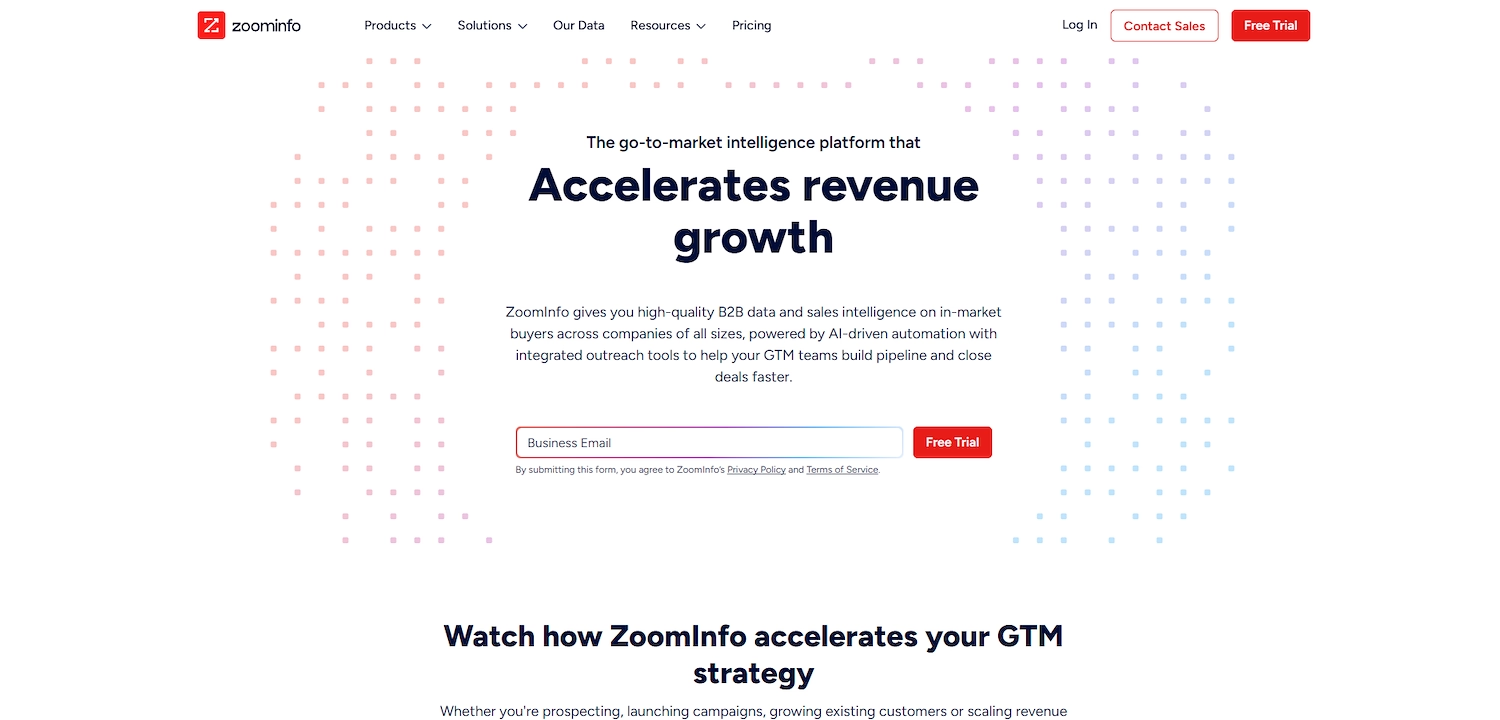
ZoomInfo SalesOS is a go-to-market platform with a B2B database. It provides company and contact information to help sales teams find and close customers. The data includes buying signals to support lead generation, account discovery, data enrichment, and personalized outreach.
ZoomInfo SalesOS's Main Features
- Includes a generative AI assistant, Copilot, that provides recommendations on who to contact, when to engage them, and what to say.
- Offers layered tools for conversation intelligence (Chorus), sales engagement (Engage), and data orchestration (RingLead).
- Provides purchasing intent data to identify companies that are actively looking for solutions.
- Features data cleaning and enrichment capabilities, along with integration to CRM and marketing automation platforms.
How ZoomInfo SalesOS Compares to Crunchbase
Average Review score: 4.5/5 stars based on 8,738 G2 reviews.
- ZoomInfo SalesOS includes a generative AI assistant, Copilot, that recommends who to contact and when. This provides proactive guidance, which is different from the on-demand data search in Crunchbase.
- The platform offers purchasing intent data to find companies actively looking for solutions. This is a more direct sales signal compared to the funding-round alerts common on Crunchbase.
- It integrates sales tools for conversation intelligence and engagement directly into the platform. In contrast, Crunchbase users typically export data to separate tools for outreach and analysis.
- This tool provides data cleaning and enrichment features to maintain CRM accuracy. This is a more developed function compared to the basic data export options available on Crunchbase.
Where ZoomInfo SalesOS Falls Short of Crunchbase
- ZoomInfo SalesOS focuses on contact and intent data for sales outreach. In comparison, Crunchbase offers more detailed historical funding data and cap table information, which is useful for financial analysis.
- The platform's focus is on established B2B contacts. As a result, it sometimes has less data on very early-stage startups than Crunchbase, which often tracks new companies from their inception.
- Its pricing model requires a sales inquiry and is aimed at larger teams. This approach is different from Crunchbase, which provides transparent pricing and a free tier, making it more accessible for individuals or small businesses.
- Some users report that the platform's extensive features can lead to a steeper learning curve. In contrast, Crunchbase provides a more straightforward interface for quick company discovery and data lookups.
Pricing and Subscription Costs
Crunchbase offers transparent pricing with its Pro plan at $588 per year. In contrast, ZoomInfo SalesOS requires a sales inquiry for its custom pricing, a model aimed at enterprise customers.
9) Oracle DataFox
Oracle DataFox is a data intelligence platform that uses AI to provide company information. It helps sales and marketing teams find and prioritize accounts. The tool integrates with CRM systems to enrich data and support go-to-market strategies.
Oracle DataFox's Main Features
- Uses AI to source and verify company data from millions of sources.
- Provides real-time company signals to identify sales triggers.
- Integrates with CRM systems, including Oracle CX Cloud and Salesforce.
- Offers advanced filters for territory planning and account scoring.
How Oracle DataFox Compares to Crunchbase
Average Review score: 4.2/5 stars based on 201 G2 reviews.
- Oracle DataFox uses AI to provide real-time company signals. This offers more proactive sales triggers compared to the on-demand data lookup model of Crunchbase.
- The platform offers deep integration with enterprise CRM systems, particularly Oracle's own suite. This is a more central feature than the integrations available for Crunchbase.
- Its data is sourced and verified through AI-driven processes. This is different from Crunchbase, which also incorporates a community-edit model for updates.
- The tool is built for enterprise sales and marketing workflows. Crunchbase, in contrast, serves a wider audience that includes investors and market researchers.
Where Oracle DataFox Falls Short of Crunchbase
- The platform's focus is on enterprise accounts. As a result, it may have less data on very early-stage startups compared to Crunchbase, which has broad coverage of new companies.
- As an Oracle product, it is aimed at large organizations. This often means a higher cost and no free version, unlike Crunchbase, which offers more accessible plans.
- Its user interface and setup can be more complex. In contrast, Crunchbase provides a more direct layout that allows for quick data searches.
- The tool is focused on sales signals. Crunchbase, by comparison, often provides more in-depth historical funding data and investor information.
Pricing and Subscription Costs
Crunchbase offers transparent pricing with its Pro plan at $588 per year. In contrast, Oracle DataFox pricing is not public and requires a sales inquiry, which is typical for an enterprise-level product. For a quote, contact an Oracle sales representative.
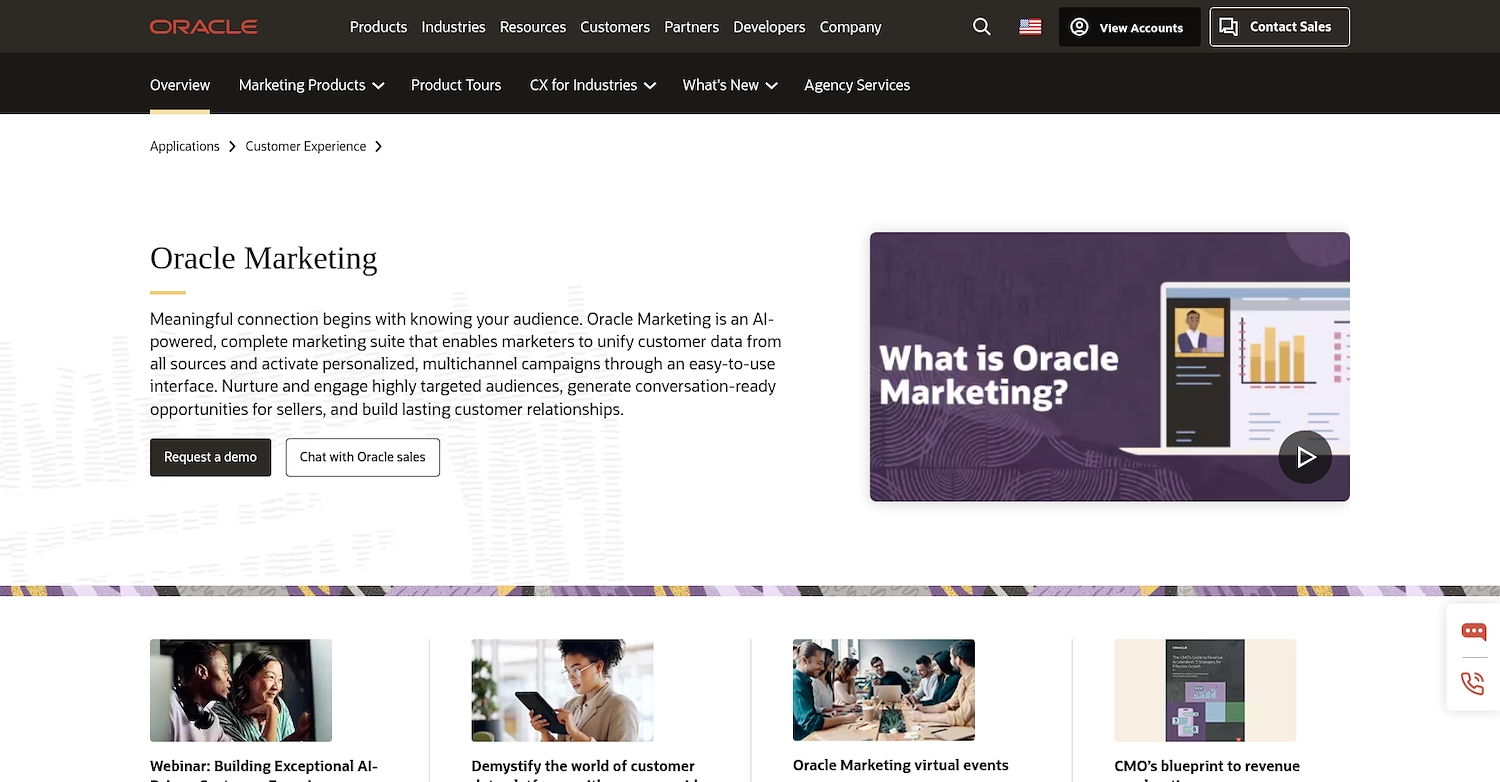
Oracle DataFox is a data intelligence platform that uses AI to provide company information. It helps sales and marketing teams find and prioritize accounts. The tool integrates with CRM systems to enrich data and support go-to-market strategies.
The platform provides real-time company signals to identify sales triggers. Its B2B database includes advanced filters for territory plans and account evaluation.
Oracle DataFox's Main Features
- Enriches customer records with over 70 firmographic data points and 68 types of company signals.
- Integrates with CRM and marketing automation platforms to keep company data updated within workflows.
- Builds dynamic prospect lists to support sales prospecting and account-based marketing campaigns.
- Provides account-level insights and timely alerts based on real-time company signals.
How Oracle DataFox Compares To Crunchbase
Average Review score: 4.3/5 stars based on 75 G2 reviews.
- Oracle DataFox enriches customer records with over 70 firmographic data points and 68 types of company signals. This provides a deeper level of company detail compared to the standard firmographic data on Crunchbase.
- The tool offers deep integration with CRM and marketing automation platforms. This allows for continuous data updates directly within existing workflows, a more integrated approach than Crunchbase's data export functions.
- It uses AI to provide real-time company signals for sales triggers. This offers a more proactive way to find opportunities, while Crunchbase focuses more on user-driven searches for funding and company news.
- The platform includes advanced filters for territory planning and account scoring. This helps sales teams prioritize accounts with more specific criteria than the broader funding-stage filters on Crunchbase.
- It builds dynamic prospect lists to support account-based marketing campaigns. This is a more specialized feature for sales campaigns compared to the general company list-building capabilities of Crunchbase.
Where Oracle DataFox Falls Short of Crunchbase
- Oracle DataFox focuses on enterprise accounts, so it may have less information on very early-stage startups. Crunchbase, in contrast, offers broader coverage of new companies and their initial funding rounds.
- The tool is an Oracle product aimed at large organizations, which means it does not offer a free version. This is different from Crunchbase, which provides a free tier and transparent pricing plans for smaller teams.
- Some users find that its interface can be complex and requires training. In comparison, Crunchbase generally provides a more direct layout that allows for quick data searches.
- It is built to provide real-time sales signals for account management. Crunchbase, by comparison, often gives more detailed historical funding data and investor information for financial analysis.
Pricing and Subscription Costs
Crunchbase offers transparent pricing with its Pro plan at $588 per year. In contrast, Oracle DataFox requires a sales inquiry for its custom, enterprise-focused pricing. For the most accurate information, visit Oracle DataFox's official website.
10) D&B Hoovers
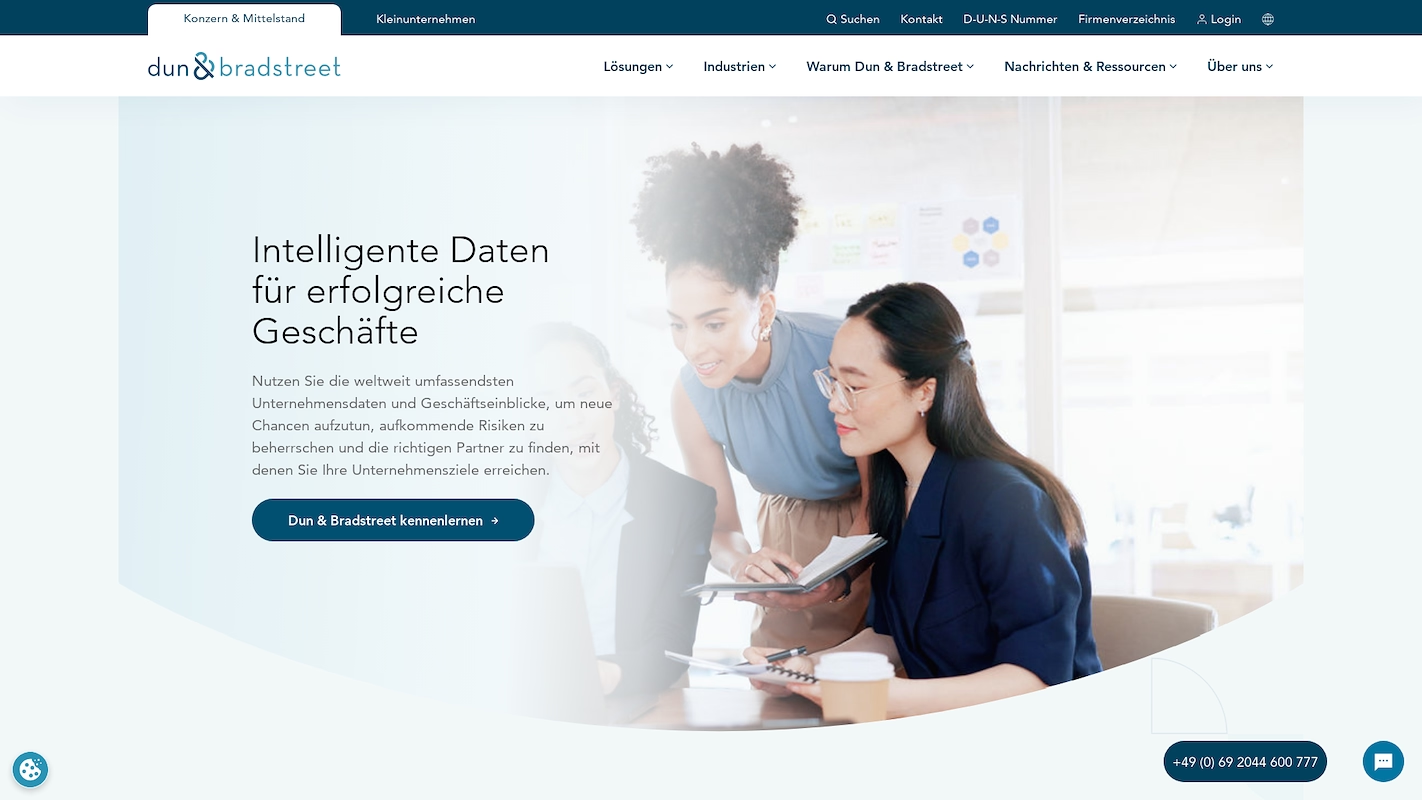
D&B Hoovers is a sales intelligence platform that offers a B2B database. It provides data and analytics to support lead generation. Users can identify sales triggers, build targeted lists, and find new business opportunities.
The tool helps sales and marketing teams find qualified prospects to build a sales pipeline.
D&B Hoovers's Main Features
- Offers access to over 272 million company profiles and 412 million contacts, anchored by the D-U-N-S Numbering System.
- Integrates intent data from Bombora, Visitor Intelligence, and D&B's custom sources to identify active buyers.
- Includes visualizations for Ideal Customer Profile and Total Addressable Market to help discover opportune markets.
- Delivers real-time opportunity triggers, company news, organizational charts, and technology infrastructure details.
How D&B Hoovers Compares To Crunchbase
Average Review score: 4.1/5 stars based on 717 G2 reviews.
- D&B Hoovers offers access to over 272 million company profiles anchored by its D-U-N-S Numbering System, a different data verification method compared to Crunchbase's community-driven model.
- The platform integrates intent data from sources like Bombora to identify active buyers, which provides a more direct sales signal than the funding-based alerts on Crunchbase.
- It includes visualizations for Ideal Customer Profile and Total Addressable Market, helping users discover markets in a more visual way, while Crunchbase focuses on list-based discovery.
- The tool delivers details on company organizational charts and technology infrastructure, offering a deeper operational view, whereas Crunchbase profiles center more on funding history and investors.
Where D&B Hoovers Falls Short Of Crunchbase
- D&B Hoovers focuses on established companies, so it may have less data on early-stage startups. Crunchbase, in contrast, often provides broader coverage of new companies and their initial funding rounds.
- Some users report that its data can sometimes be outdated. This is different from Crunchbase, which uses a community-edit model that can allow for faster updates on company information.
- The platform's pricing is not public and is aimed at enterprise teams. In comparison, Crunchbase offers transparent pricing plans and a free version, which makes it more accessible for individuals or small businesses.
Pricing and Subscription Costs
Crunchbase offers transparent pricing with its Pro plan at $588 per year. In contrast, D&B Hoovers requires a sales inquiry for its custom pricing, a model aimed at enterprise customers. For a quote, visit the D&B Hoovers website.
Which One Should You Go With?
Many variables influence the choice of a Crunchbase alternative. This guide reviewed several options to help you make an informed decision based on your specific needs.
If your goal is to automate sales tasks instead of just accessing data, consider 11x. Our platform uses digital workers for lead research, outreach, and CRM updates. This frees your sales team to focus on deal closure and strategic growth.




